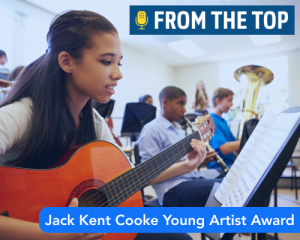Top 3 scholarships for music students overall
We’ve hand-picked the following scholarships based on the strong reputation of their organizations, the value of the awards, and being open to a wide number of students. Apply with confidence to these 3 top scholarships for music students:
- Gucci Changemakers North America Scholarship – For current or incoming college students majoring in marketing, art, design, film, communications, or other creative fields. Worth $20,000
- Jack Kent Cooke Young Artist Award – For musicians between the ages 8 and 18 who plan to study classical music at a high level in the United States. Worth $10,000
- Ocean Awareness Scholarship – For students aged 11-18 who submit writing, artwork, or a dance piece about the importance of conserving the ocean. Worth $1,500
Whether you are interested in pursuing an education in composition or performing arts, in classical music, world music, rock, jazz, funk, or any type of genre, we’ve got scholarships for you. Keep on reading to learn more about our top music scholarships including eligibility, award amount, and application deadlines!
How to win music scholarships
Like any type of scholarship, music scholarships receive a lot of applications. To stand out and win a scholarship, you’ll have to put a lot of thought into your essays and application materials. Before you begin applying, try sitting down and doing some reflection. Think about what has led you to pursue a music education, and how you work your background, upbringing, and culture into your work.
If you have already completed your own projects or been a member of an ensemble, think about how these experiences have shaped your goals and demonstrated your potential. Consider the change you hope to make in the world through your music, where you want to be in 5 years, and how you plan to get there.
Next it’s time to get your brainstorming down on paper. Don’t worry about grammar or succinctness here, just get your ideas on the page in bullet points or sentence fragments or whatever feels most natural to you. Once you begin writing your essays, these notes will come in handy often.
Also see: Top summer music programs for high school students
Writing a great essay
Writing a great scholarship essay is a unique craft that takes some time to get used to. Luckily, we can help you do it through guides on how to write a winning scholarship essay, how to start and end your essay, and how to write about yourself. We can also help you respond to common scholarship essay prompts, including “Why do you deserve this scholarship?” Finally, check out our guides to tailoring your writing to 250 or 500 word limits.
Resources for music students
Delta Omicron
Delta Omicron is an international business fraternity for music students of all gender identities. They have chapters at many colleges throughout the country and facilitate lectures, recitals, networking opportunities, and much more.
American Music Therapy Association
The AMTA is a national organization that helps support and develop the field of music therapy all across the country. Student membership is only $95 per year and comes with perks such as literature from the organization, networking opportunities, and trainings.
Need-based financial aid for music students
If you are a current or prospective music major, you may also qualify for need-based financial aid through your college or through the government. There are two major financial aid applications you should know about:
- Free Application for Federal Student Aid (or FAFSA) which is how students can access financial aid through the government. This financial aid can include federal student loans, Federal SEOG Grants, and Pell Grants.
- CSS Profile which is how some colleges and universities award institutional financial aid.
Be sure to check-in with your college to see what applications are required for need-based financial aid.
Frequently asked questions about music scholarships
Do I need to major in music for music scholarships?
Some music scholarships require that their applicants be majors, while others will accept hobby musicians. Opportunities such as the John Lennon Scholarship award students based on their music submission, but do not require them to study music in college. However, scholarships such as the one offered at Berklee College of Music require that you major in the field.
There may also be some scholarships that allow students who minor or concentrate in music. The rules will vary by scholarship, so if you have any doubts, don’t hesitate to reach out to the organization offering the scholarship. It can never hurt to make sure, and it might even help your chances of winning the scholarship by showing your interest.
Can I get music scholarships for all types of music?
Are there music scholarships for both playing and composing?
Can I get a scholarship for music production?
Music production and audio engineering students have less scholarships available than some other fields, but they are certainly out there! The Audio Engineering Society has a great list of scholarship opportunities for audio engineering students in undergrad or graduate programs. Some are even offered by the society itself.
Audio engineering students can also reach out to the institution they hope to attend, or even look into local scholarships as a way to fund their education.
Do colleges offer music scholarships?
What instrument is most likely to get a scholarship?
That being said, it is generally easiest to get a scholarship for an instrument that is not especially competitive. Instruments such as the harp, oboe, french horn, trombone, and the bassoon are less widely played than more common instruments like the guitar, piano, or drums. So, schools will likely be more willing to offer scholarships to students that play these instruments to create a diverse student base.
Other scholarship categories to explore
- Top art scholarships
- Scholarships for vocalists
- Musical theatre scholarships
- Instrument scholarships
- Marching band scholarships
- Film scholarships
- Top video scholarships
Join for exclusive scholarships, personalized matching, and application tracking. 0% Spam, 100% Free.































